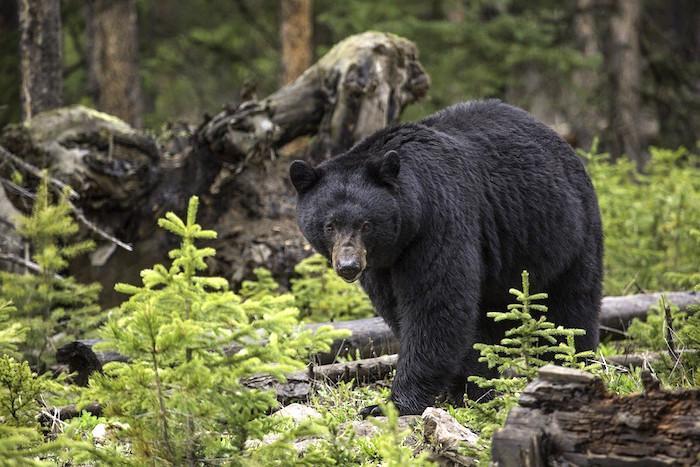
Great Smoky Mountains National Park visitors were cited for feeding peanut butter to a bear/Tennessee Wildlife Resources file
Visitors who were captured on video feeding a black bear peanut butter at Great Smoky Mountains National Park have been cited, park staff said Monday.
“Managing wild bears in a park that receives more than 12 million visitors is an extreme challenge and we must have the public’s help,” said Great Smoky wildlife biologist Bill Stiver. “It is critical that bears never be fed or approached - for their protection and for human safety.”
Prior to the incident, the 100-pound male bear had been feeding on walnuts for several weeks along the Cades Cove Loop Road. The bear started to exhibit food-conditioned behavior, leading wildlife biologists to suspect the bear had been fed.
The visitors were cited June 3. They could face a fine of $5,000 and a prison term of six months. Additional details regarding the number of visitors cited was not immediately available.
Biologists captured the bear, tranquilized it, and marked it with an ear tag before releasing it on site in the same general area. Through aversive conditioning techniques rangers try to discourage bears from frequenting parking areas, campgrounds, and picnic areas where they may be tempted to approach vehicles in search of food. These techniques include scaring bears from the roadside using loud sounds or shooting them with paint balls.
Park officials remind visitors about precautions they should take while observing bears to keep themselves and bears safe. Until the summer berries ripen, natural foods are scarce. Visitors should observe bears from a distance of at least 50 yards and allow them to forage undisturbed. Bears should never be fed.
While camping or picnicking in the park, visitors must properly store food and secure garbage. Coolers should always be properly stored in the trunk of a vehicle when not in use. All food waste should be properly disposed to discourage bears from approaching people.
Hikers are reminded to take necessary precautions while in bear country including hiking in groups of three or more, carrying bear spray, complying with all backcountry closures, properly following food storage regulations, and remaining at a safe viewing distance from bears at all times. Feeding, touching, disturbing, or willfully approaching wildlife within 50 yards (150 feet), or any distance that disturbs or displaces wildlife, is illegal in the park.
If approached by a bear, park officials recommend slowly backing away to put distance between yourself and the animal, creating space for it to pass. If the bear continues to approach, you should not run. Hikers should make themselves look large, stand their ground as a group, and throw rocks or sticks at the bear. If attacked by a black bear, rangers strongly recommend fighting back with any object available and remember that the bear may view you as prey. Though rare, attacks on humans do occur, causing injuries or death.
For more information about how to be BearWise, please visit www.bearwise.org. Local residents are reminded to keep residential garbage secured and to remove any other attractants such as bird feeders and pet foods from their yards. To report a bear incident outside of the park, please call Tennessee Wildlife Resources Agency or North Carolina Wildlife Resources Commission.



Comments
Throw the book at those nincompoops giving that poor bear peanut butter. They meant well, but the way to hell is paved with good intentions. A nice fine would serve as an effective deterrence. Some well publicized prison time of even ta fortnight would work. We must protect our wildlife in our sanctuaries.
A fed bear is a dead bear.
give them people tickets and the Rangers have their hands full when they deal with so many people,They should have the right to hand out tickets for being to close to bears wildlife.And the money could help for the wild.pe don't care about the signs.
Why can't people just observe! Why do they tempt fate and try to interact. If that bear injures or kills them then that poor bear would be put down for simply being a bear and the other is an idiot. No one in this day and time has an excuse to not know they should never feed wildlife. I hope they get they maximum penalty and at least a night in jail to drive it home for them and for everyone that hears their story. They already got away with their life, for that they should be thankful.
People don't realize that if you feed wild life they can become depend on it. They will stop finding natural foods in the wild and hunt in areas where people are. This could eventually be fatal for our wildlife lets all do our part protecting these animals. Godbless everyone.
Not exactly. They do become dependent on it, but a lot of bears (especially juveniles that learn behavior from watching mama bear or other bears) won't hunt or forage once they learn to take handouts. Foods that humans eat are calorie rich and don't require as much physical exertion to obtain. Some will learn how to just grab food. Sometimes there have been people who found it really cute that a bear was getting close and seemed to be "friendly" only to find the bear wasn't too happy that they weren't getting handouts.
They meant well!!!!!!!?????????
You are absolutely right. People feed our alligators in Florida and then they start attacking dogs and children.